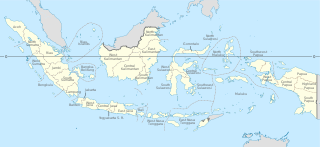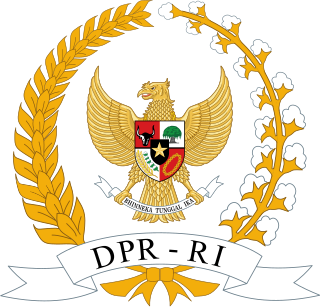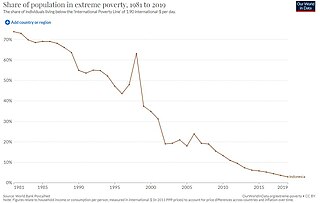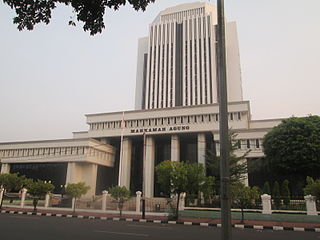
Provinces are the first-level administrative divisions of Indonesia. It is formerly called the first-level provincial region before the Reform era. Provinces have a local government, consisting of a governor and a regional legislative body. The governor and members of local representative bodies are elected by popular vote for five-year terms, but governors can only serve for two terms. Provincial governments have the authority to regulate and manage their own government affairs, subject to the limits of the central government. The average land area of all 38 provinces in Indonesia is about 49,800 km2 (19,200 sq mi), and they had an average population in mid 2023 of 7,334,111 people.

The House of Representatives of the Republic of Indonesia is one of two elected chambers of the People's Consultative Assembly (MPR), the national legislature of Indonesia. It is considered the lower house, while the Regional Representative Council (DPD) serves as the upper house; while the Indonesian constitution does not explicitly mention the divide, the DPR enjoys more power, privilege, and prestige compared to the DPD.

The Welfare Party was an Islamist political party in Turkey. It was founded by Ali Türkmen, Ahmet Tekdal, and Necmettin Erbakan in Ankara in 1983 as heir to two earlier parties, National Order Party (MNP) and National Salvation Party (MSP), which were banned from politics. The RP participated in mayoral elections at that time and won in three cities Konya, Şanlıurfa, and Van. Their vote percentage was approximately 5%.

Poverty in Indonesia is a widespread issue though in recent years the official numbers show a declining trend. Due to the dense rural nature of parts of the Java, Bali, Lombok, and parts of Sumatra, poverty can be classified into rural and urban poverty. Urban poverty is prevalent in not only in Jabodetabek, but also in Medan and Surabaya.
Indonesia is divided into provinces. Provinces are made up of regencies and cities (kota). Provinces, regencies, and cities have their own local governments and parliamentary bodies.

In Indonesia, village or subdistrict is the fourth-level subdivision and the smallest administrative division of Indonesia below a district, regency/city, and province. Similar administrative divisions outside of Indonesia include barangays in the Philippines, Muban in Thailand, civil townships and incorporated municipalities in the United States and Canada, communes in France and Vietnam, dehestan in Iran, hromada in Ukraine, Gemeinden in Germany, comuni in Italy, or municipios in Spain. The UK equivalent are civil parishes in England and communities in Wales. There are a number of names and types for villages in Indonesia, with desa being the most frequently used for regencies, and kelurahan for cities or for those communities within regencies which have town characteristics. According to the 2019 report by the Ministry of Home Affairs, there are 8,488 urban villages and 74,953 rural villages in Indonesia. North Aceh Regency contained the highest number of rural villages (852) amongst all of the regencies of Indonesia, followed by Pidie Regency with 730 rural villages and Bireuen Regency with 609 rural villages. Prabumulih, with only 12 rural villages, contained the fewest. Counted together, the sixteen regencies of Indonesia containing the most rural villages—namely, North Aceh (852), Pidie (730), Bireuen (609), Aceh Besar (604), Tolikara (541), East Aceh (513), Yahukimo (510), Purworejo (469), Lamongan (462), South Nias (459), Kebumen (449), Garut (421), Bojonegoro (419), Bogor (416), Cirebon (412), and Pati (401)—contain one-third of all the rural villages in Indonesia. Five of these are located in Aceh, two in Highland Papua, three in Central Java, two in East Java, three in West Java, and one in North Sumatra. An average number of rural villages in the regencies and 15 cities of Indonesia is 172 villages. A village is the lowest administrative division in Indonesia, and it is the lowest of the four levels. The average land area of villages in Indonesia is about 25.41 km2 (9.81 sq mi), while its average population is about 3,723 people.

Taliabu Island Regency is a regency in the North Maluku province of Indonesia, consisting primarily of the island of Taliabu, the most western, geographically, of the Sula archipelago. It is located to the west of Mangole Island and Sanana Island, the two islands which remain part of the former Sula Islands Regency; until 14 December 2012, when it was administratively-separated into its own regency, Taliabu had been a part of the Sula Islands Regency. Presently, Taliabu Island Regency covers roughly 1,507.41 km2. Taliabu had a population of 47,309 at the 2010 Census and 58,047 at the 2020 Census; the official estimate as at mid 2023 was 64,885.
Law of Indonesia is based on a civil law system, intermixed with local customary law and Dutch law. Before European presence and colonization began in the sixteenth century, indigenous kingdoms ruled the archipelago independently with their own custom laws, known as adat. Foreign influences from India, China and the Middle East have not only affected culture, but also the customary adat laws. The people of Aceh in Sumatra, for instance, observe their own sharia law, while ethnic groups like the Toraja in Sulawesi still follow their animistic customary law.

The Judiciary of Indonesia constitutionally consists of the Supreme Court of Indonesia, the Constitutional Court of Indonesia, and the lesser court system under the Supreme Court. These lesser courts are categorically subdivided into the public courts, religious courts, state administrative courts, and military courts.
Mungkid is the capital of Magelang Regency, Central Java, Indonesia. The town center is located in the village of Sawitan. All government offices or agencies of Magelang regency are located there, including the offices owned by private parties. Mungkid town was founded on March 22, 1984 to replace the city of Magelang as the capital town of Magelang regency. Each March 22 is celebrated by the citizens of Magelang regency as Mungkid's anniversary. Many people consider this town as an administrative town and alternative city. The major Buddhist temple of Borobudur is about 4 km from the center of Mungkid.

Minahasa Regency is a regency in North Sulawesi, Indonesia. Its capital is Tondano. It covers an area of 1,141.64 km2 and had a population of 310,384 at the 2010 Census; this rose to 347,290 at the 2020 Census, and the official estimate as at mid 2023 was 351,920.
In Indonesia, a regional regulation is a regulation that is passed by Indonesian local governments and carry the force of law in that region. There are two levels of regional regulations. Provinces pass provincial regulation, while the second tier subdivisions of Indonesia, known as regencies and cities pass regency regulation and city regulation, respectively. Each type of regional regulation is passed by the region's parliamentary body together with their chief executive.
The Indonesian electoral law of 2017, also known in Indonesia as Undang-Undang Pemilu, is the law regulating elections in Indonesia. Officially, it is known as the Law Number 7 of 2017. The law was passed in July 2017 following nine months of debate in the People's Representative Council.
The Job Creation Act, officially Act Number 11/2020 on Job Creation, is a bill that was passed on 5 October 2020 by Indonesia's House of Representatives, with the aim of creating jobs and raising foreign and domestic investment by reducing regulatory requirements for business permits and land acquisition processes. Due to its length of 1,035 pages and its coverage of many non-employment sectors, it is also referred to in Indonesia as an omnibus bill. The final draft was changed to 812 pages due to pagination being changed to legal format. After being passed into law, there were various substantial text alterations and deletions, as well as procedural issues, which made its legal status eligible for being formally annulled.

The Public Prosecution Service of the Republic of Indonesia is the government agency of Indonesia authorized for conducting public prosecution in Indonesia. It has other duties and authorities over certain matters as prescribed by laws.

Nusantara Capital City Authority is a cabinet level-agency formed by the Indonesian government, working directly under the President of Indonesia. The agency will become a special agency tasked with managing and governing the city of Nusantara, future capital of Indonesia located on Kalimantan.
Law on State Capital is an omnibus law to relocate capital of Indonesia from Jakarta to Nusantara at East Kalimantan as new capital of Indonesia. The omnibus bill of the law was passed into law on 18 January 2022, and finally commenced on 15 February 2022.

A village-owned enterprise, often shortened to BUMDes or BUM Desa, is a type of company that is managed and established by an Indonesian village. These companies span a wide array of industries, from agriculture and mining to tourism and retail. BUMDes are a relatively recent development in Indonesia, first appearing in the aftermath of fall of Suharto and the rapid decentralization that followed. As of 2022, according to data from the Ministry of Villages, Development of Disadvantaged Regions, and Transmigration, there are total of 74,691 registered BUMDes. However, due to bureaucratic difficulties, only around 10 percent (7,902) are certified as legal entities as of 2022.
The Indonesian Criminal Code, commonly known in Indonesian as Kitab Undang-Undang Hukum Pidana, abbreviated as KUH Pidana or KUHP), are laws and regulations that form the basis of criminal law in Indonesia. By deviating as necessary from Presidential Regulation dated 10 October 1945 No. 2, it stipulated that the criminal law regulations that are in effect are the Dutch criminal law regulations that existed on 8 March 1942. Currently, the Republic of Indonesia has its own Criminal Code, that is due to take effect in 2026.
The Criminal Code Act 2023, also known as the 2023 Indonesian Criminal Code, is the new criminal code in Indonesia, replacing the Dutch-era code. This law is the most comprehensive and time-consuming legislation ever crafted in Indonesia, having taken over 50 years to develop since its initial formulation.












